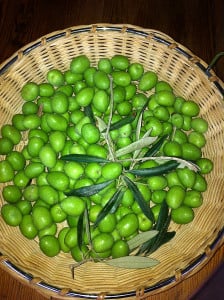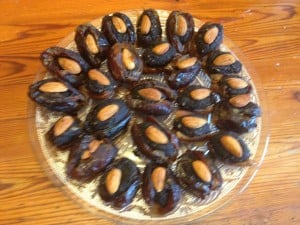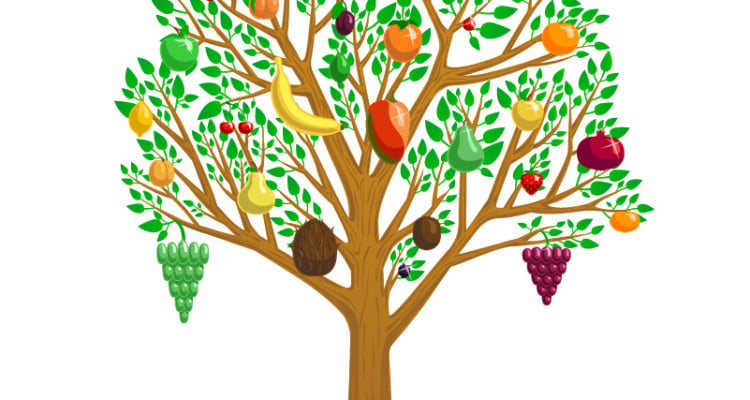Tu b’Shvat, which falls this year on February 4 and celebrates the fruits of the Land of Israel, is one of those holidays that have received little attention until the last few decades.

Olives are an Israeli specialty. (Photo: The Seven Fruits of the Land of Israel)
Named for the day on which it falls – the 15th day of the Hebrew month of Shvat – Tu b’Shvat marks the “New Year” for trees. It is the season in which the trees begin to bloom and bear fruit.
One of the reasons that Tu b’Shvat is one of my favorite holidays is that it connects us to the fruits of the Land of Israel. The Torah singles out seven species through which the Land of Israel is praised in Deuteronomy 8:9–10. This is because these fruits embody the holiness of the Land of Israel.
These Species are especially suited to the climate of the Land of Israel and grow abundantly even without additional irrigation. In Jewish tradition, when reciting the blessings over various foods, the Seven Species take precedence. Even if you currently live outside of the Holy Land, one way to connect yourself to the Land of Israel is by partaking of these Seven Species, especially on Tu b’Shvat.
The Tu b’Shvat Seder
The Tu b’Shvat Seder celebrates the yearning to return to the Land of Israel. In 16th–century Safed (Tzfat) the students of Rabbi Isaac Luria (the Arizal) compiled a Tu b’Shvat Seder somewhat similar to the Seder for Passover. It involves appreciating the fruits of the tree, particularly those native to the Land of Israel. The Tu b’Shvat Seder is based primarily on Kabbalistic sources. Since the order and the contents of the Seder do not follow specific Jewish law, there is much room for flexibility and creativity to conduct the Seder in your own way.
Practical Guidelines for Conducting a Tu b’Shevat Seder
The Tu b’Shvat Fruit Seder facilitates partaking of the fruits of the Land in a mindful way, enjoying their colors, textures and tastes, while praising God for the fruits with intentional blessings. For more than 30 years the special Tu b’Shvat Fruit Seder, which I enjoy with students, family and friends, is the centerpiece of my Tu b’Shvat celebration. You could invite each of the participants to bring one kind of fruit and share insights about it. Be creative! Decorate your table with fragrant flowers, include songs and meditations of your choice between each of the sequences. Just as Passover is accompanied by the Hagadah, we have produced a Tu b’Shvat Seder Text, which includes texts with verses from the Bible and passages from the Oral Torah describing the various fruits. I included our beautifully illustrated Tu b’Shevat Hagaddah in my book, The Seven Fruits of the Land of Israel where I also included additional teachings about the hidden holiday of Tu b’Shvat.
Chana Bracha Siegelbaum is founder and director of Midreshet B’erot Bat Ayin: Holistic Torah for Women on the Land in Bat Ayin, Israel. Her new book, The Seven Fruits of the Land of Israel with their Mystical & Medicinal Properties (Menorah Books), was released recently and won two Gourmand Awards: Best Fruit Book and Best Jewish Cuisine in Israel.
Sample Recipe from the Book: Almond Chocolate-Filled Dates
Absolutely fabulous, flavorful and festive, worth the extra effort
20 large pitted dates

Almond Chocolate-Filled Dates (Photo: The Seven Species of the Land of Israel)
40 whole almonds
Almond-Chocolate Filling:
1⁄3 cup ground almonds
1⁄3 cup cocoa or cacao powder
2 tablespoons honey or date syrup
1 tablespoon shredded coconut
1 teaspoon pure vanilla extract
1/2 teaspoon cinnamon
1/4 cup techina
- Process the almonds in the food processor with the S-blade until minced.
- Add remaining ingredients and process until everything is well-combined.
- Assemble the dates by taking a heaping teaspoon of the almond-chocolate filling and wrapping it around an almond.
- Fill a date cavity with the almond covered by the almond-chocolate filling.
- Press an almond in the center of the almond chocolate-filled date.
- Repeat steps 3–5 in order to assemble the rest of the dates.
By: Chana Bracha Siegelbaum





